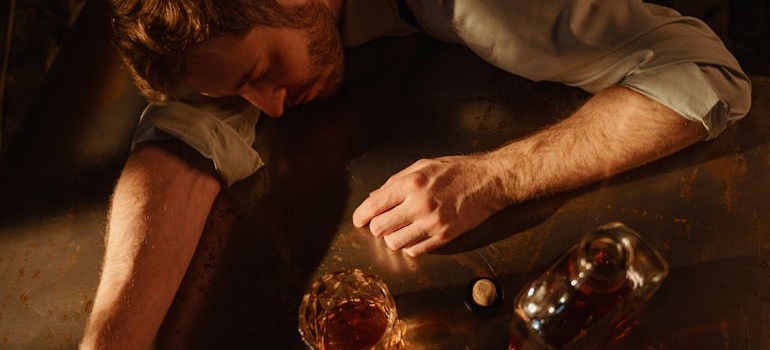Struggling to sleep when you’re battling addiction is more common than you think. Addiction fuels insomnia and vice versa, creating a cycle that’s hard to break. You might find yourself wide awake at night, overwhelmed by thoughts, cravings, or withdrawals. Sleep feels out of reach, but the lack of it only worsens your situation. It’s frustrating, and you’re not alone in this. Places like Harmony Ridge Recovery Center WV can help you start getting the sleep you need while addressing the root causes of addiction. Breaking the cycle takes time, but finding the right support can make it easier. Don’t let the sleepless nights keep you stuck—help is available, and you deserve to rest.
Understanding Addiction and Insomnia
Addiction is when you lose control over the use of substances like alcohol or drugs, or behaviors like gambling. It takes over your life, making it hard to stop even when it’s causing harm. Addiction fuels insomnia and vice versa, creating a frustrating cycle. Symptoms of addiction include:
- Strong cravings
- Loss of control
- Withdrawal symptoms
- Neglecting responsibilities

Insomnia is when you struggle to get the sleep your body needs. It can come in different forms, like finding it hard to fall asleep, waking up during the night, or waking up too early. This lack of sleep can worsen addiction. Symptoms of insomnia include:
- Trouble falling asleep
- Waking up often at night
- Waking up too early
- Feeling tired during the day
How Addiction Contributes to Insomnia
Addiction often leads to insomnia, keeping you awake when you need rest the most. The substances that seem to help at first actually disrupt your sleep long-term. We’ll dive into how addiction makes it harder to sleep and what you can do to break this exhausting cycle. You deserve better rest.
Substance-Induced Sleep Disruptions
Substances like alcohol, stimulants, and opioids can seriously disrupt your sleep patterns. While alcohol might make you feel sleepy at first, it can actually wake you up throughout the night and prevent deep sleep. Stimulants like cocaine or meth can keep you wired for hours, making it impossible to rest. Opioids, though often sedating, can also interfere with your natural sleep cycle, leading to poor-quality rest.
Over time, these disruptions make your insomnia worse, and you may find yourself caught in a vicious cycle. If you need help to understand these patterns you should turn to motivational interviewing for substance abuse, and it can help you make healthier choices. Breaking free from this cycle can lead to better sleep and a clearer mind.

Neurochemical Imbalances
Addiction changes the way your brain works, especially with neurotransmitters like dopamine and serotonin. These chemicals play a big role in how you feel and how well you sleep. Addiction throws this balance off, making it hard for your brain to regulate sleep. You may feel wired or exhausted at the wrong times, and it’s frustrating.
Over time, this imbalance can make both addiction and insomnia worse. If you need help, dialectical behavior therapy for addiction can help you manage these changes. You’re not stuck in this cycle—there are ways to reset your brain chemistry and improve both your sleep and your recovery.
Lifestyle Factors
The lifestyle that often comes with addiction can make sleep problems worse. Late nights, irregular schedules, and unhealthy habits throw off your body’s natural rhythm, making it harder to sleep at regular times. Poor diet, lack of exercise, and stress only add to the problem. You might find yourself awake at odd hours or struggling to settle down because of the chaos in your life.
These habits make it nearly impossible to get restful sleep, which then feeds back into the cycle of addiction. You deserve a healthy routine that helps you feel better, both mentally and physically. There are ways to regain control of your sleep and your life, and it all starts with small, positive changes.
How Insomnia Can Lead to Addiction
Insomnia can push people toward addiction, as they seek relief from sleepless nights. We’ll explore how this happens and what you can do to avoid falling into that trap. There are healthier ways to manage your sleep struggles.
Self-Medication
When insomnia becomes unbearable, it’s common to turn to alcohol, sleeping pills, or drugs in hopes of finally getting some sleep. It might seem like an easy solution at first, but self-medicating can quickly lead to dependency and more serious problems. Over time, substances like alcohol or sleeping pills stop working, and you may find yourself needing more just to get through the night.
This is where addiction can begin to take hold. This is why benzo addiction treatment is often necessary for those who’ve relied on medications like benzodiazepines to sleep. It’s a tough cycle to break, but there are healthier ways to manage insomnia without turning to substances.
Increased Tolerance and Dependence
Using substances like alcohol or sleeping pills to manage insomnia might seem helpful at first. But over time, your body gets used to them, leading to increased tolerance. That means you need more and more of the substance just to feel the same effects. As your tolerance builds, so does your dependence.
What once helped you sleep can quickly become something you rely on to get through the night, and eventually, this dependence can turn into addiction. It’s a tough cycle that feels hard to escape, but it’s important to know that help is available. You can find healthier ways to manage your insomnia and break free from the hold of substances.
Mental Health Impact
Chronic insomnia can take a serious toll on your mental health. When you’re constantly tired, it becomes harder to manage stress, anxiety, and even depression. Over time, this lack of sleep may push you toward addictive behaviors as you look for ways to cope. It’s a vicious cycle—addiction fuels insomnia and vice versa. Turning to alcohol or drugs might seem like a quick fix, but it only makes things worse in the long run.
To break this cycle, it’s important to address both issues together. Psychotherapy for addiction, combined with strategies to improve sleep, can make a real difference. There are ways to feel better and get the rest you need without relying on substances.

The Vicious Cycle: Addiction and Insomnia Feeding Each Other
Addiction and insomnia often feed into each other in different ways, making recovery feel harder. We’ll explore how these two are connected and what you can do to break the cycle. There are ways to manage both, and finding the right approach can help you feel more in control again.
Mutual Reinforcement
Insomnia and addiction often feed off each other, creating a difficult cycle to break. Addiction fuels insomnia and vice versa, making it harder to recover. When you’re unable to sleep, you might turn to alcohol or drugs for relief, but these substances actually disrupt sleep patterns even more.
The lack of rest can worsen addiction cravings, pushing you deeper into the cycle. This constant back-and-forth makes it feel impossible to find stability. The more you struggle to sleep, the harder it is to stay sober. And the more you rely on substances, the worse your insomnia gets. Recognizing this connection is the first step to healing. You deserve support and rest. Help is out there.
Impact on Recovery
The cycle of addiction and insomnia makes recovery much harder. When addiction fuels insomnia and vice versa, it becomes a constant battle. Poor sleep weakens your ability to cope, making it difficult to focus on your recovery goals.
You may feel drained, overwhelmed, and more likely to relapse. Sleep deprivation also messes with your emotions, making sobriety seem impossible at times. This cycle is tough, but breaking free from it is possible. Addressing both addiction and insomnia together can give you a better chance at lasting recovery.
Long-Term Consequences
The long-term effects of addiction and insomnia can seriously impact your physical and mental health. The constant lack of rest combined with substance use takes a toll on your body and mind, leading to problems that may feel overwhelming. Over time, this cycle increases the risk of:
- Chronic diseases like heart disease and diabetes
- Cognitive decline, making it harder to concentrate and remember things
- Emotional instability, causing anxiety, depression, and mood swings
These issues don’t just go away on their own. Breaking the cycle now can help prevent further damage. You deserve to feel better, and there are ways to heal. Start with small steps toward healthier sleep and recovery.

Breaking the Cycle: Strategies for Managing Both Conditions
Breaking the cycle of addiction and insomnia is essential to your well-being. When addiction fuels insomnia and vice versa, it can feel overwhelming. We’ll cover strategies to manage both, so you can find relief. It’s important to treat addiction as a disease, addressing it with care, support, and proper tools. You deserve to reclaim your health and rest.
Integrated Treatment Approaches
Treating addiction and insomnia at the same time is crucial for real recovery. Ignoring one while focusing on the other can keep you stuck in the same harmful cycle. An integrated approach, combining therapy, medication, and lifestyle changes, can make a big difference. Approaches such as individual therapy for addiction can help you tackle the root causes of both issues.
Medication can help ease withdrawal and promote sleep, while lifestyle changes—like setting a regular bedtime or practicing relaxation techniques—support long-term recovery. You don’t have to do this alone. Addressing both problems together gives you the best chance at breaking free from addiction while improving your sleep. It’s all connected, and a balanced approach will help you move forward in your recovery journey.

Cognitive Behavioral Therapy for Insomnia (CBT-I)
Cognitive behavioral therapy for insomnia (CBT-I) can help you break the cycle of insomnia and addiction. It’s a method that focuses on changing the thoughts and behaviors that keep you awake. Instead of turning to addictive substances, CBT-I helps you develop healthy sleep patterns without medication. It can teach you how to manage racing thoughts, set a consistent sleep schedule, and make changes to your environment that promote rest.
Many people who struggle with addiction also face sleep issues, so combining this approach with cognitive behavioral therapy for substance use disorders can be very effective. CBT-I targets the root causes of insomnia, so you can start sleeping better and make real progress in your recovery.
Healthy Sleep Hygiene
Building healthy sleep habits is key to recovery from addiction and improving your sleep quality. Start by creating a calming bedtime routine. Go to bed and wake up at the same time every day, even on weekends. Avoid screens, caffeine, and heavy meals before bedtime. Try to make your bedroom a place for rest—keep it quiet, dark, and comfortable.
A simple meditation or deep breathing exercise can also help you relax before sleep. Additionally, holistic therapy for addiction often includes learning these habits to support recovery. Remember, sleep and recovery go hand in hand.

Support Systems
Getting support makes a huge difference when you’re dealing with both addiction and insomnia. You don’t have to go through this alone. Surrounding yourself with people who understand your struggles can make the process feel less overwhelming. Here are some groups and resources you can reach out to:
- Alcoholics Anonymous (AA)
- Narcotics Anonymous (NA)
- SMART Recovery
- National Alliance on Mental Illness (NAMI)
- American Academy of Sleep Medicine (AASM)
- National Sleep Foundation (NSF)
Ending the Cycle of Addiction and Insomnia
Addiction fuels insomnia and vice versa, creating a tough cycle to break. Without proper sleep, addiction symptoms often get worse, and without addressing addiction, restful nights are rare. You don’t have to face this on your own. If you’re struggling with both addiction and insomnia, getting help could be the turning point you need. Don’t let another sleepless night hold you back—reach out to professionals who understand what you’re going through and can guide you toward real recovery. There’s a way forward, and it begins with getting the support you deserve.



